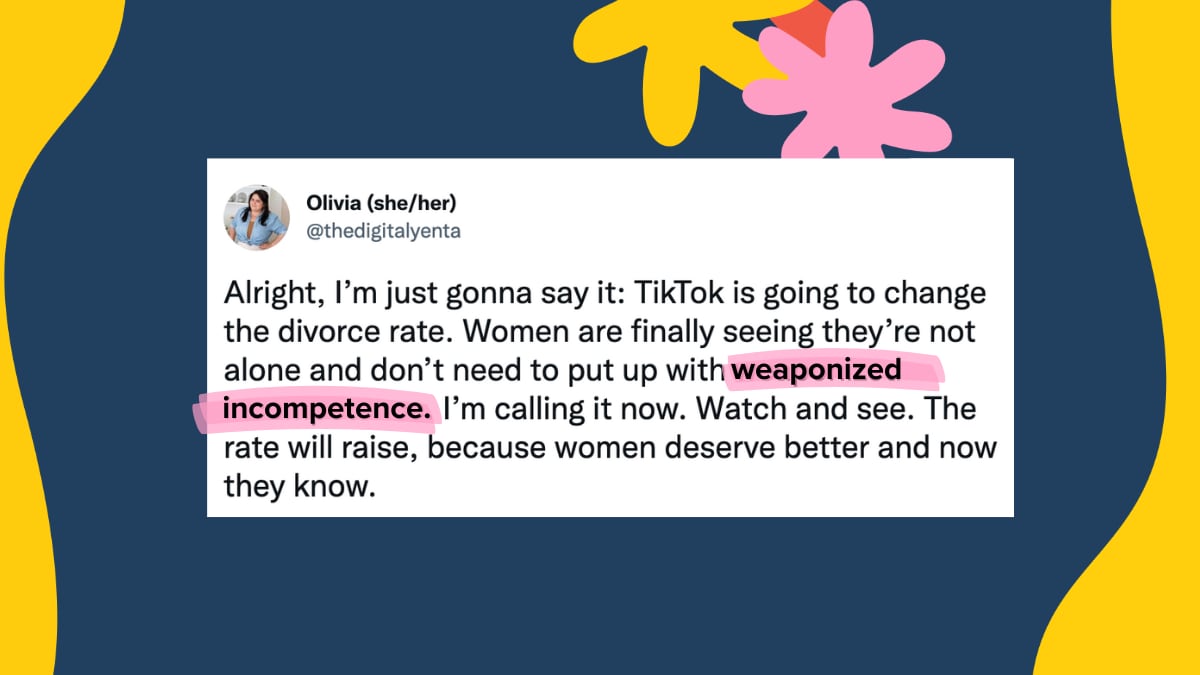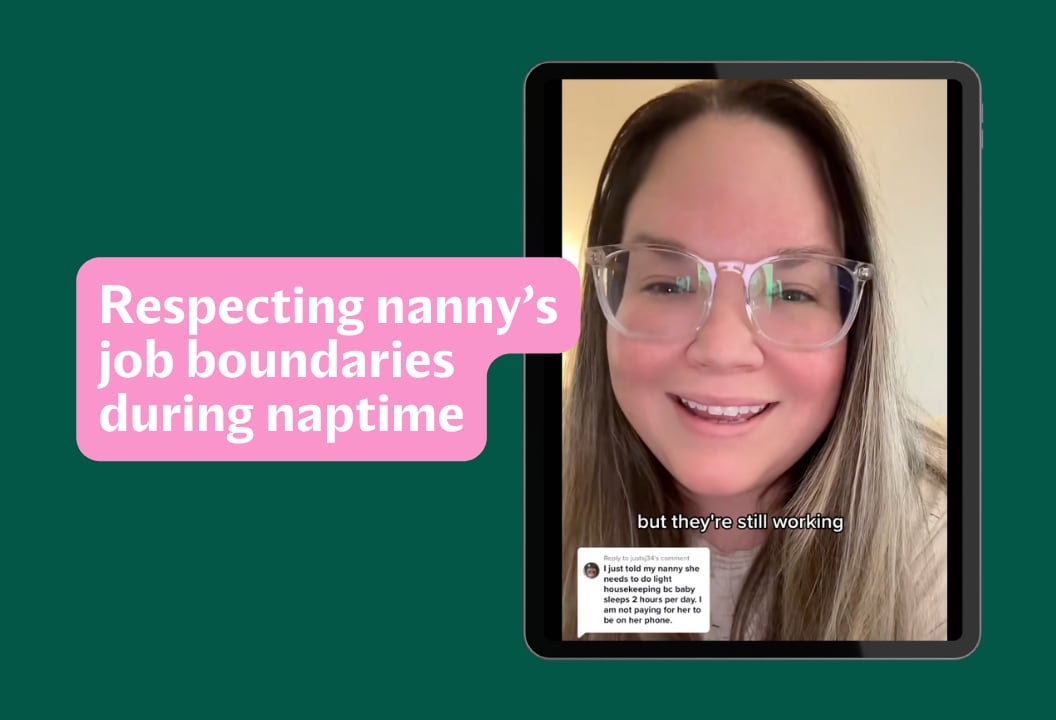When “weaponized incompetence” started trending online in 2020 and 2021, millions of people suddenly had a name for a problem they’ve experienced over and over again but weren’t sure how to describe or discuss.
The term — a shorthand for claiming ignorance in order to get out of doing your fair share of labor — has become a mainstay on social media and changed the way people talk about relationships and gender equality in the home. But now that we have a new vocabulary for discussing the often unfair division of labor in marriages, partnerships and even at work, you might be wondering, where do we go from here?
Here’s how the online conversation about weaponized incompetence is changing the way we talk about, deal with and even prevent household inequality.
Refresh my memory: What is weaponized incompetence?
Weaponized incompetence can be used to describe a lot of situations. It happens when a coworker feigns confusion in order to shirk administrative tasks or when you have a friend who says you’re just better at making plans than they are, therefore it’s always your job. But the term has been most enthusiastically embraced by people who are married or in long-term partnerships, particularly women in heterosexual relationships.
Since the early days of the pandemic, discussions about weaponized incompetence have dominated TikTok, Twitter and Instagram. As many women looked around and realized they were tackling the majority of the housework, child care and remote schooling, even while working full-time and having their partner at home to presumably share the load, they started calling out the behavior they were seeing.
If you search TikTok for the hashtag #weaponizedincompetence, the videos that come up have more than 64 million views. They include not only people defining the term but also providing examples of how it plays out in their homes and relationships, be it a dad who falls asleep when he is supposed to be supervising his infant or husbands who can’t carry out basic chores without constant supervision.
A new community takes on weaponized incompetence at home
Having easy phrases like “weaponized incompetence” or the “mental load” to describe inequalities at home is a relatively new phenomenon, says Kate Mangino, a gender expert and author of “Equal Partners: Improving Gender Equality at Home.”
“The books that came out in, say 2015, those authors had a hard time publishing them because they couldn’t convince anyone there was household inequality,” she explains. “Everyone was like, ‘What are you talking about? Everything’s great. We reached our goal.’ I credit the pandemic with sort of opening everyone’s eyes to the fact that there is still extreme inequality.”
More widespread recognition of the problem has led to the rapid development of a sense of community among people who experience these problems on a regular basis. Some, like attorney Elizabeth Gil, are relieved to finally have the language to describe the everyday frustrations that she previously felt but couldn’t name.
“I am grateful literally every day to whoever coined the term ‘weaponized incompetence, because it finally gave a name to the blinding rage I feel when the average straight cis white man goes, ‘Oh, but you’re just soooo much better at [admin task] than I am, can you do it??'” ” she writes on Twitter.
Others think the increasing awareness about household inequality is going to change the face of marriage and relationships forever. According to some, it might even result in a ton of break-ups.
“Alright, I’m just going to say it: TikTok is going to change the divorce rate,” says one CEO and single parent. “Women are finally seeing they’re not alone and don’t need to put up with weaponized incompetence. I’m calling it now. Watch and see. The rate will raise, because women deserve better and now they know.”
‘Weaponized incompetence’ changes the conversation about household inequality
It isn’t just a sense of community that’s developing quickly, thanks to all of this viral attention on weaponized incompetence; it’s also the sense that we can do something about it. More people are learning how to spot this problem in their own relationships, how to confront it and even how to preempt it.
Weaponized incompetence is societal, not personal.
One of the first steps to stopping weaponized incompetence is talking about it with your partner. Now, spouses who are able to safely communicate with one another about this issue have more tools to understand and discuss the problem in a global way — something Mangino says may ultimately be more effective.
“If you’re talking about yourself and your partner, I think the best thing that you can do is to take it away from the personal and elevate it to socialized norms,” she explains.
“Talk about it in terms of, ‘We are falling into this like all these other people have, and it’s not our fault. It’s the way we were socialized, but it’s bad for both of us, so how we can change our actions to stop it?'”
— KATE MANGINO, GENDER EXPERT AND AUTHOR OF “EQUAL PARTNERS: IMPROVING GENDER EQUALITY AT HOME”
Mangino did this herself while working on her dissertation years ago. “I had a mental breakdown like every other woman who’s trying to raise little kids,” she says. “Because I was finishing a dissertation on the intersection of masculinities and women’s empowerment, I knew what to say, and I just said, ‘We’re falling into the trap that tens of thousands of other couples fall into. You are raised to prioritize your job, and I was raised to prioritize the home, and I’m having a very hard time reaching my professional goals right now.”
Ultimately, the larger conversation about weaponized incompetence proves that it isn’t just one person’s problem or one couple’s issue, and that makes it easier to come together to address it.
“It might not work for everyone cause you might not have a partner who’s open to it, but take it away from ‘what you’re doing wrong’ and ‘why I’m angry’,'” Mangino says. “Talk about it in terms of, ‘We are falling into this like all these other people have, and it’s not our fault. It’s the way we were socialized, but it’s bad for both of us, so how we can change our actions to stop it?”
We can stop weaponized incompetence for the next generation.
The conversation online has given us a new ability to get to the roots of weaponized incompetence and other household inequalities.
“I think that this conversation has been stuck with 30-somethings and 40-somethings with little kids, and the problem is so much greater than a nuclear family,” notes Mangino. “We need to be talking to our nieces and nephews, kids, younger cousins and anyone who’s single or starting to date. It needs to be on their radar before they partner so that as they’re meeting people that can be part of the conversation and they can set those expectations.”
By understanding and pushing back against the normalization of weaponized incompetence, we have the opportunity demonstrate new kinds of partnership dynamics to our kids and to break the generational cycles that contribute to the problem in the first place.
“On the days when it’s not going anywhere with your partner, it’s like, ‘OK, this isn’t working in my house this week, but I’m going to do something else,'” Mangino says. “I’m going to teach my son how to make dinner. I’m going to talk to my niece about her new boyfriend.”
Naming it means we can (finally) change it.
Mangino believes that “naming things and putting words to behaviors that we have accepted” breaks the myth that we can’t change those behaviors.
Just being able to use the term “weaponized incompetence” has given it credence as a problem that is worthy of our collective attention. That means it’s no longer relegated to being a hidden source of tension between individual couples or something that can be easily dismissed as “just the way things are.”
It’s real. It has a name. And that gives us more of an ability to create new boundaries and take action.
“There’s power in language,” Mangino says. “It’s like mansplaining. We have been experiencing mansplaining for decades, but it wasn’t until someone used the word that we were all like, ‘Oh yeah, that happens to me every day. And now that I have a quick term for it and everyone else understands it, I can say, ‘No, don’t do that to me. I’m not going to stand for it.’”





